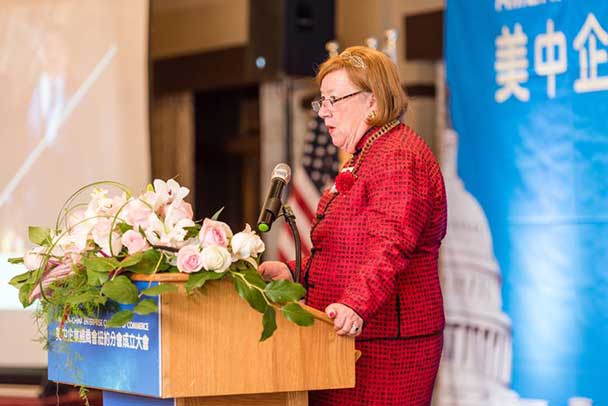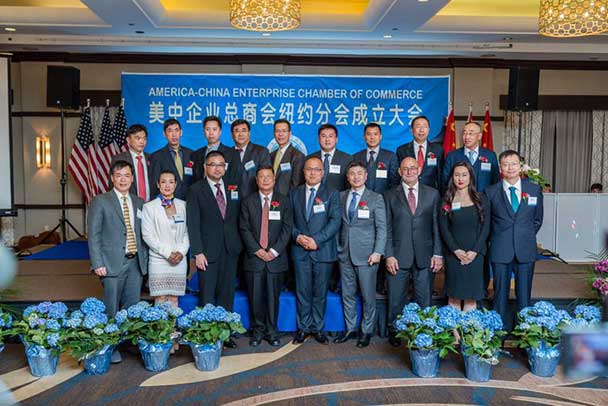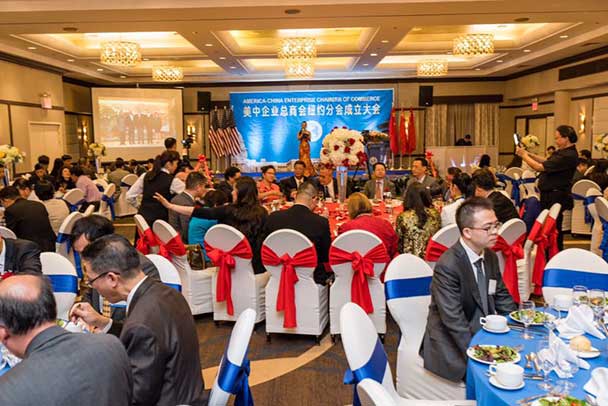Signs of rapport between leaders, free trade appears to survive but leaders need to cooperate
China would benefit if it adopts measures to narrow the U.S-China trade deficit, Mary Wadsworth Darby said recently at a gathering of Chinese and American business leaders and observers.

Ms. Darby, who is the Chief Representative of CKGSB-Americas, was speaking at the opening ceremony of the America China Enterprise Chamber of Commerce (ACECC) New York Chapter. An expert on US-China relationship, she told the audience that US President Donald Trump has been moving away from his acerbic anti-trade rhetoric, which were particularly aimed at China. President Trump, Ms. Darby said, has exhibited greater accommodation toward free trade. However, she said, the president would need political capital; in other words, achievements that would yield benefits for the swing voters who propelled him to the White House against all odds.
“After making a bold statement early in his administration with the withdraw from the Trans Pacific Partnership, the president’s progress on reforming trade policy has come to a halt,” Ms. Darby said.
She laid out the case that reducing the trade deficit would help the U.S. administration to walk back from its anti-China talk, and it would benefit both countries.
She noted that although President Trump repeatedly vowed to aggressively renegotiate NAFTA, he has largely abandoned the North American issues in recent weeks. “The president also recently reversed his position on labeling China as a currency manipulator, telling The Wall Street Journal last week that he no longer considers China to be manipulating the renminbi,” Ms. Darby said.
Now, China is in the position to make gestures of its own. Ms. Darby, for instance, suggested that China can open the Chinese auto market to American makers, which currently is all but shut to US brands as China slaps 35% tariff on all imported cars or automobile parts. China also forbids any foreign entity from owning a controlling interest in a Chinese automotive firm.
“Rescinding such a rule would not only put President Xi in the good graces of the Trump Administration, but it would ultimately be to China’s benefit as its auto sector is made more efficient through international competition,” said Ms. Darby.
This is critical because it was votes from the auto manufacturing states of Michigan and Ohio, as well as the industrialized states of Pennsylvania and Wisconsin that sent Donald Trump to the White House. Three of these states had voted reliably for Democratic candidates for several decades and were considered safely in Hillary Clinton’s column.
There are signs that the Chinese leader is flexible to open up markets. “President Xi has already indicated his willingness to make concessions on issues like allowing more imports of U.S. beef and allowing majority foreign ownership of financial services companies in China.”
While China’s move to open its market to American manufactured products would provide Mr. Trump political capital, and help forge a better relationship between the two countries’ leaders; it can also help mute some of the anti-China sentiments in the United States; and ultimately, open the American market to areas that China is interested in; namely, investment opportunities for State-owned enterprises abroad.
Last November, the U.S.-China Economic and Security Review Commission advised Congress to completely ban investment in the U.S. by state-owned enterprises. Ms. Darby said that moves such as opening China’s auto market to the United States can help overcome this opposition.
China has also reached a conjunction that requires it to transition from its heavy focus on export-driven economy to expanding consumer purchasing power to ensure the sustainability of its economic success and stability.
“Sure, China’s surplus supports domestic employment, but that additional employment is achieved in part by suppressing wages and consumer buying power, while using scarce resources to subsidize big business. To help move the economy away from debt-financed accumulation of capital towards an economy based on consumer spending,” Ms. Darby said.
US Administration in transition
Beyond his words, or lack of it, the president’s latest reshuffling of his top advisors and lieutenants profess his willingness to move away from the trade war he promised during his campaign. “One method for divining his intentions is to look at which advisors have won his favor in the first months of his administration,” Ms. Darby said.

In recent weeks the protectionist wing of the administration, represented by former Breitbart News publisher and self professed ‘economic nationalist,’ Steve Bannon; and Peter Navarro, a professor in the University of California at Irvine’s business school who is the head of the new White House National Trade Council, have lost considerable influence within the administration. There are plausible signs that Mr. Bannon may even be replaced.
“Navarro’s role in the White House should be of particular concern to advocates of a non-confrontational trade relationship between the U.S. and China, as he once directed and produced a movie called “Death by China,” which argues that the U.S. has suffered immeasurably from China’s accession to the World Trade Union. He is also a fierce advocate of bilateral rather than multilateral trade deals, and is therefore deeply skeptical of the World Trade Organization itself,” Ms. Darby said.
In fact, Navarro and Commerce secretary Wilbur Ross co-wrote a paper last year saying that a President Trump should impose tariffs on China and other countries and encourage changes in consumer buying habits to erase the huge U.S. trade deficit.
“But it appears that these figures are increasingly becoming marginalized. Trump has hinted that Bannon may not be in his job much longer, while there is little evidence that Navarro’s advice is being taken seriously,” Ms. Darby said.
Conversely, Gary Cohn, the president’s chief economic advisor and Director of the National Economic Council, has gained cloud. Mr. Cohn, who is a former President and Chief Operating Officer at Goldman Sachs, holds views on China that are much less confrontational and more mainstream.
Ms. Darby said Mr. Cohn fought back against the notion that China is a currency manipulator, and his comments on trade deals like NAFTA lean toward wanting sensible reform, rather than a withdraw from that trade pact. More importantly, Mr. Cohn has spoken to the economic importance of good U.S.-China relations.
“Cohn’s ascent and the marginalization of Bannon and Navarro should be good news for those hoping that the Trump Administration will take less of a hardline on China, and work towards mutually beneficial trade reforms rather than punitive trade wars. He has hired staffers, like Andrew Quinn, a former trade official who served as a senior negotiator during the Obama administration’s push for a Trans-Pacific Partnership, suggesting that Cohn will push for a much more traditional approach on trade,” Ms. Darby said.
Aligned Interest
Beyond the bilateral relationship, the two giant powers share the interest of global peace and prosperity.

Ms. Darby said: “If one takes a more wide-angle view of the situation, however, one sees that China’s interests and the U.S.’s interests are actually quite aligned. The larger goals of global economic growth, global peace and the prevention of nuclear proliferation, and stable multinational institutions that serve both Chinese and U.S. interests are shared by both the United States and China, and the successful resolution of disputes in the near term are essential to achieving these long-term goals.”
North Korea’s pursuit of nuclear weapons and the territorial dispute in China’s backyard are the top non-economic issues for the two countries. “The territorial disputes in the South China Sea could pit the U.S. and its allies against China. Either one of these situations deteriorating significantly could overwhelm the will of either nation to engage in mutually beneficially reform,” Ds. Darby said.